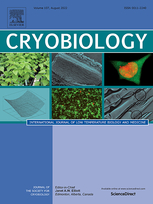
Evaluation approfondie des effets et des mécanismes de fonctionnement des protéines antigel lors de la conservation à basse température.
A comprehensive evaluation of the effects and mechanisms of antifreeze proteins during low-temperature preservation.
Auteurs : WANG J. H.
Type d'article : Article
Résumé
During the past 10 years, it has become clear that the effects of antifreeze proteins (AFPs) on cell viability and on thermodynamic properties during low-temperature preservation are complex. The paper reviews studies systematically. It is shown that AFPs can display both protective and cytotoxic actions and both nucleation of ice and inhibition of ice crystal growth, depending on several factors including the specific storage protocol, the dose and type of AFP, the composition and concentration of cryoprotectant, and the features of the biological material. A novel model is proposed to explain this dual effect of AFPs during cryopreservation. AFP-ice complexes have some affinity interactions with cell membranes and with many other molecules present in cryopreservation solutions. When the intensity of these interactions reaches a certain level, the AFP-ice complexes may aggregate, thereby inducing ice nucleation and loss of the ability to inhibit recrystallization.
Détails
- Titre original : A comprehensive evaluation of the effects and mechanisms of antifreeze proteins during low-temperature preservation.
- Identifiant de la fiche : 2001-2950
- Langues : Anglais
- Source : Cryobiology - vol. 41 - n. 1
- Date d'édition : 08/2000
Liens
Voir d'autres articles du même numéro (3)
Voir la source
-
The high viscosity encountered during freezing ...
- Auteurs : MORRIS G. J., GOODRICH M., ACTON E., et al.
- Date : 06/2006
- Langues : Anglais
- Source : Cryobiology - vol. 52 - n. 3
Voir la fiche
-
Isolation of ice-nucleating active bacteria fro...
- Auteurs : LEE M. R., LEE R. E., STRONG-GUNDERSON J. M., MINGES S. R.
- Date : 08/1995
- Langues : Anglais
- Source : Cryobiology - vol. 32 - n. 4
Voir la fiche
-
The use of cryopreservation in the ex-situ cons...
- Auteurs : SMITH D.
- Date : 03/1998
- Langues : Anglais
- Source : Cryo-Letters - vol. 19 - n. 2
Voir la fiche
-
Ice nucleation in freeze-tolerant vertebrates.
- Auteurs : COSTANZO J. P., LEE R. E. Jr
- Date : 03/1996
- Langues : Anglais
- Source : Cryo-Letters - vol. 17 - n. 2
Voir la fiche
-
The basis for hyperactivity of antifreeze prote...
- Auteurs : SCOTTER A. J., MARSHALL C. B., GRAHAM L. A., et al.
- Date : 10/2006
- Langues : Anglais
- Source : Cryobiology - vol. 53 - n. 2
Voir la fiche
